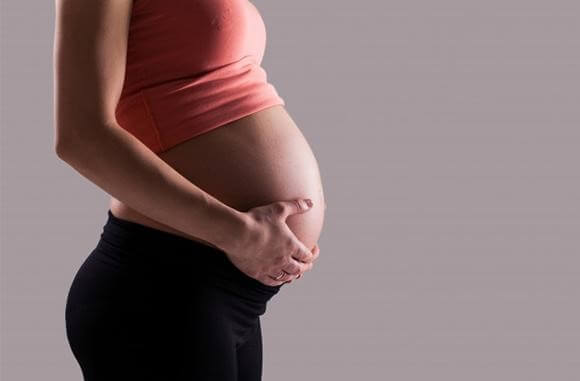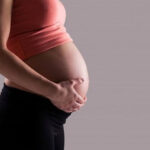
I am pregnant. Am I at the risk of testing positive for COVID-19?

COVID-19 and its transmission:
COVID-19 was first identified in Wuhan, China by the end of the year 2019. A healthcare professional may diagnose COVID-19 based on signs, symptoms and purported exposure, or using a positive test for SARS-CoV-2 even when there are no palpable symptoms.
Infectivity and transfer
The majority of cases involving COVID-19 transmission denote the evidence of human-to-human transfer. The virus is readily isolable from respiratory droplets faeces, fomites or bodily secretions. Close or accidental contact with an infected person or an infected surface may transmit the virus. When it comes to the possibility of vertical transmission, evidence suggests that it may be uncommon for a pregnant lady to transmit the virus prenatally. In the event of a transmission of the virus from mother to her child, it suggests various possibilities. It may be least affected by the factors such as delayed cord clamping, skin-to-skin kangaroo care, breastfeeding or colocation (rooming-in).
Possible risk of catching COVID-19 in pregnancy
At present, there's no concrete evidence to conclude whether pregnant women are more prone to COVID-19 infection than the nonpregnant counterparts. However, it may be noted that pregnancy involves various physiological changes. The changes even include alterations in the immune system. The alterations in the immune system may make a few women more prone to infections with a marked reduction in the body's defences against virulent microbes. However, there may be a group of women more prone to severe complications from COVID-19 infection. Certain complications may even require hospitalization. Therefore, precautions and preventive measures against exposure to the virus are important.
Is it safe to continue with prenatal care in the COVID-19 pandemic?
Of course, it's safe and important. Obstetricians worldwide are striving to make the most out of healthcare availabilities. They are busy making all the possible changes and help patients and healthcare staffs prevent COVID-19 exposure. Most obstetric setups and firms dedicated to obstetric care are converting traditional antenatal care to tele-healthcare. However, it doesn't mean the traditional visits will no longer be available. Most setups treat common symptoms using telephonic consultations or video consultations.
Various pregnancy-specific tests may continue based on your consent and your obstetrician's decisions. Your obstetrician may guide you about how to count the kick and ascertain that the baby is healthy and hale and hearty. You might consider buying something like a blood pressure cuff and a scale. It will make it easy for you to produce your blood pressure and other parameters during telehealth sessions.
Steps to safeguard yourself from COVID-19 in pregnancy:
- Most guidelines to ensure personal safety during the COVID-19 pandemic for pregnant women are the same as those for nonpregnant counterparts.
- Stay home, stay safe.
- Wear a mask while moving out.
- Observe healthy social distances and restrict your social interactions with others.
- Use a sanitiser preferably recommended by your obstetrician.
- Use a handwash recommended by your obstetrician and wash hands regularly, and specifically after an interaction with an outsider.
- Avoid visiting places with rush and crowd.
What is the risk of preterm birth with COVID-19?
Owing to the lack of knowledge on the virus and its interventions in obstetric health, people have less awareness about COVID-19 impact on pregnant women. Studies worldwide haven't concluded anything on the possible rise in the risk of spontaneous abortion in pregnant women with COVID-19. Women with a certain medical history and health status may be more prone to COVID-19 complications.
If a pregnant woman develops severe symptoms with COVID-19 infection, she may need ICU attention and early delivery. Nonetheless, the data available about the correlation between the virus and preterm delivery is less. Therefore, it may be unwise to conclude that COVID-19 can be the direct cause of preterm delivery.
Is it true that pregnant women may transmit the virus to their baby during pregnancy and childbirth?
Respiratory or saliva droplets of an infected person are the main modes that may infect a healthy person with COVID-19. Few cases of COVID-19 are reported in neonates. The good news is that most pregnant women infected with COVID-19 gave birth to healthy neonates. Studies are yet to find any traces of coronavirus in cord blood, breastmilk or amniotic fluid. The evidence available on the overall infectivity is unclear.
Alterations in prenatal care to minimize the risk of COVID-19
The healthcare setups should consider crafting alterations for low-versus-high-risk pregnancies. Women with pregnancy-specific disorders or pre-existing conditions like Hypertension, Diabetes mat require special attention. Healthcare departments should restrict the number of visitors and enhance the quality of care based on various parameters.
What are the symptoms of COVID-19 infection in pregnancy?
Most pregnant women infected with COVID-19 remain asymptomatic. Most women with symptoms may develop flulike signs alongside mild to moderate cold. The other uncommon symptoms may include diarrhoea, loss of taste and smell, myalgia and dyspnoea. Pregnant women infected with COVID-19 may be more prone to myalgia and fever than the nonpregnant counterparts.
Severe complications of COVID-19 infection in pregnant women
About two-thirds of pregnant women infected with COVID-19 are asymptomatic. But women with COVID-19 are more likely than the nonpregnant counterparts to get admitted to the Intensive Care Unit (ICU). Most reliable surveys show that women with COVID-19 aren't at a raised risk of death from COVID-19. But compared to pregnant women without COVID-19, some of the pregnant counterparts with symptomatic COVID-19 may encounter worse clinical outcomes.
What are the risk factors associated with COVID-19 infection in pregnancy?
- A BMI of 25kg/m2 or more
- pregnancy-specific morbidities
- Pre-existent conditions such as diabetes and hypertension
- Advanced maternal age
- Residence in high-risk areas of the areas of high prevalence
What are the effects of COVID-19 on foetal health?
COVID-19 positive women who are symptomatic may have to face certain challenges ahead. Nonetheless, the studies or data available on the risk of COVID-19 on the foetus are scarce. Symptomatic maternal COVID-19 may be linked to an increase in the risk of iatrogenic preterm birth. Besides preterm birth, COVID-19 infection may not leave any harmful effects on the foetal health or neonatal outcomes.
The evidence denoting any possibility of congenital anomalies isn't yet available. There is no concrete evidence to date showing any possibilities of neonatal mortalities or stillbirth in response to maternal COVID-19 infection. There is no evidence even suggesting that spontaneous abortion is possible in the wake of maternal COVID-19 infection.
Related Blogs

Understanding Different Types of Vaginal Birth Delivery
Read More
How to Treat and Prevent Brown Discharge
Read More
Endometriosis Understanding, Diagnosing, and Managing the Condition
Read More
Emotional Support During IVF Treatment
Read More
Understanding Gestational Diabetes: Insights from Dr Shruthi Kalagara
Read More
Urinary Tract Infection (UTI) in Pregnancy
Read More
Early Pregnancy Care for New Pregnant Women: Expert Advice | Motherhood Hospitals
Read More
Body Positivity Tips Post C Section (Cesarean Delivery)
Read More
Vaginoplasty: Procedure, Cost, Risks & Benefits, Recovery
Read More
The Digital Dilemma: Exploring the Medical Implications of Technology on Child Development
Read MoreRequest A Call Back
Leave a Comment:
View Comments
Previous
Next
HELLO,
Stay update don our latest packages, offer, news, new launches, and more. Enter your email to subscribe to our news letter


 Toll Free Number
Toll Free Number








No comment yet, add your voice below!